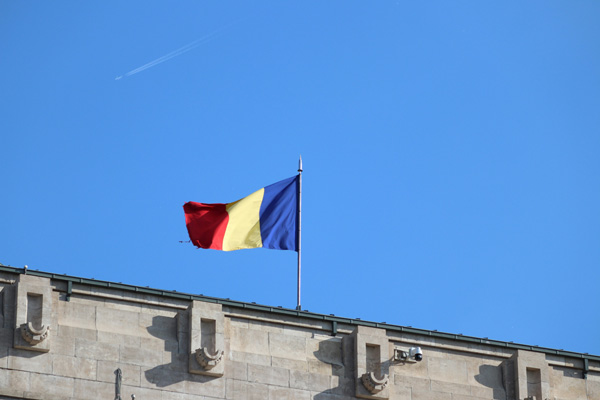Romania holds re-election following months of political turmoil

[A photo of a Romanian flag. Photo credit to Unsplash]
On May 18th, Romania held an election that ended a long-standing political emergency triggered by the nation’s inconclusive 2024 presidential election.
The re-vote resulted in the victory of independent candidate Nicusor Dan, who was inaugurated as president on May 26.
Dan built his campaign on the promise that he could restore public trust in the government after months of corruption and political unrest.
This political unrest began in late 2024, when far-right populist Calin Georgescu won the first round of Romania’s presidential election.
Georgescu had received support from the Union of Romanians (AUR) party to run his campaign and structured his message around addressing economic downtrends and removing stagnant political parties, a message that resonated with many Romanians.
However, international bodies deemed his ideas unfit for the nation, and following the poll results, Romania’s Constitutional Court intervened.
On December 6, 2024, the court determined that the election would be annulled due to evidence of foreign intervention, with Russian disinformation campaigns and cyber-attacks being cited as the main culprits.
This development heavily polarized Romanian citizens, with some accusing the government of political sabotage, while others claimed that the decision was necessary to maintain the election’s credibility.
Supporters of the former position then proceeded to stage multiple protests in the following months that put the Romanian government in a political bind.
Georgescu's supporters demanded that the court’s decision be reverted, with tens of thousands of protesters gathering in major cities such as Bucharest, Cluj-Napoca, and Timișoara.
Many of these protests grew violent, and clashes between protesters and law enforcement became commonplace.
Due to the increasing number of protests and riots within the country, then-Prime Minister Marcel Ciolacu resigned on May 6, 2025, amid fears of a revolution.
A transitional government was then formed and tasked with overseeing a repeat election.
In the repeat election, Georgescu was removed from the ballot due to his alleged connections to the Russian parties that instigated the re-vote, and was replaced by George Simion, another candidate with ties to the AUR.
Nicusor Dan, a former Mayor of Bucharest, was seen as an early favorite to win the election.
Dan had a prominent background in civic activism and thus centered his campaign around modernizing Romania’s political system by removing corrupt and inactive figures from the government.
The re-election was held on May 18, with Dan receiving 53.6% of the vote, defeating Simion and securing his position in the government.
His victory in the election was widely viewed as the first sign of peace following a six-month period of chaos within the nation.
“The Romanian state needs a fundamental change,” Dan said in his inauguration speech on May 26, adding that he would be able to bring this change by stating, “I assure you that I will be a president who listens to the voice of society and who is a partner to that society.”
International reactions were predominantly positive, with the European Union praising Romania’s peaceful handling of the re-election, as well as Dan’s plans for reforming the nation.
Still, many analysts suggest that Romania is still infested with many deep-rooted societal problems, and that with his victory, Dan will be tasked with addressing these problems, some of which have existed for decades.

- Ian Kim / Grade 9 Session 3
- R.E. Mountain Secondary School

![THE HERALD STUDENT REPORTERS [US]](/assets/images/logo_student_us.png)
![THE HERALD STUDENT REPORTERS [Canada]](/assets/images/logo_student_ca.png)
